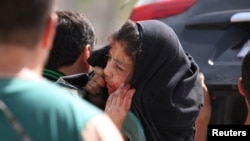Only 30 doctors remain in rebel-held eastern Aleppo, where they are in dire need of medical and surgical supplies to treat hundreds of wounded people among a trapped population of 300,000, Syrian doctors said on Monday.
At least 40 wounded people in the eight still-functioning hospitals - some of them makeshift centers hidden underground fear of air strikes and shelling - require medical evacuation, they said.
Dozens of air strikes hit rebel-held areas of the northern Syrian city overnight, a monitoring organization and a civil defense worker said, continuing a fierce air campaign by Syrian government and allied forces since a ceasefire broke down almost a week ago.
"There are 30 doctors who are still inside the eastern Aleppo city," Abd Arrahman Alomar, a pediatrician who works for the Syrian Arab Medical Society (SAMS) in opposition-controlled areas, told a news briefing in Geneva.
They lack equipment and emergency medicines for treating the many trauma cases and there is only enough fuel to run hospital generators for 20 days. One obstetrician and two pediatricians remain to care for pregnant women and 85,000 children, he said.
The group documented more than 280 people killed in the last three days in eastern Aleppo, with 400 wounded, including 61 children, on Sunday alone.
"We go into mountains, we work underground, and even our facilities underground and into the mountains were targeted many times, many times," Alomar said. "If this continues, we are going to the point of zero where there are no facilities to be protected, where there is no health staff to be protected."
Mazen Kewara, Turkey country director for SAMS, said: "We have a huge need for fluids inside Aleppo. Still there is no IV (intravenous) fluids."
Attacks on medical facilities and personnel have devastated the health care system, U.N. agencies and health experts say.
"The systematic and widespread assault on hospitals and doctors which is orchestrated mainly by Syrian government forces has cut off access to health care for hundreds of thousands, if not millions, of Syrians," said Elise Baker of Physicians for Human Rights.
Since the conflict began in 2011, the New York-based group has documented 382 attacks on 269 separate medical facilities through June.
Some 90 percent were carried out by Syrian government forces or allied Russian forces, she said, citing evidence from video footage and photographs analyzed by weapons experts.
"The direct targeting of medical units and personnel has become a shocking hallmark of this horrific conflict in Syria," said Dainius Puras, U.N. special rapporteur on the right to health.
Intentional attacks constitute war crimes and may amount to crimes against humanity, said Puras.





